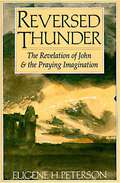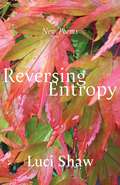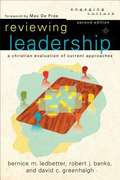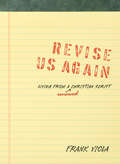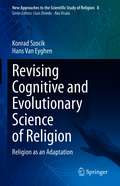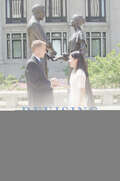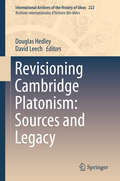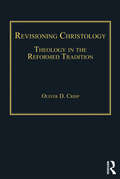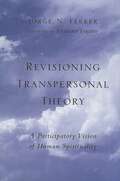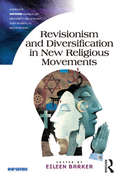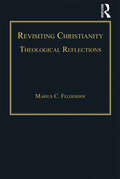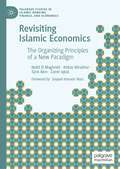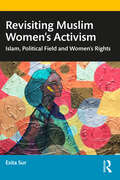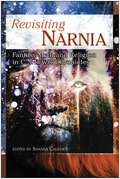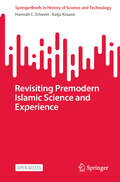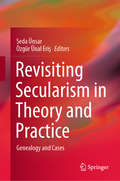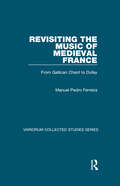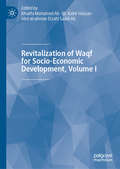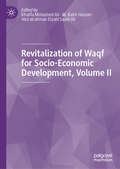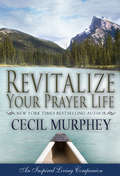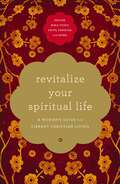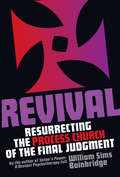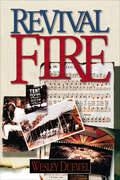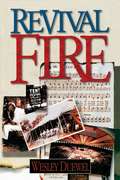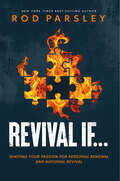- Table View
- List View
Reversed Thunder: The Revelation of John and the Praying Imagination
by Eugene H. PetersonPeterson's eloquent meditation on the Revelation of St. John engages the imagination and awakens the intellect to the vitality and relevance of the last words on scripture, Christ, church, worship, evil, prayer, witness, politics, judgment, salvation, and heaven.
Reversing Entropy: Poems
by Luci ShawFrom the pen of beloved poet Luci Shaw comes a new collection that celebrates inspired creativity as an antidote to chaos. The poet's own words best describe the heart of this pinnacle collection of new work by beloved writer Luci Shaw: Entropy: A measure of the molecular disorder, or randomness, of a system, its lack of order or predictability, resulting in a gradual decline into disorder. Our universe, and the systems within it, constantly shift from their created states of order towards disorder, or chaos. The second law of thermodynamics asserts that entropy, or disorder, always increases with time. Creative human activities such as art, architecture, music, story or film are human efforts to halt and reverse this loss of meaning. Thus, smaller systems, like individual poems, become highly ordered as they receive energy from outside themselves, from the poet. They reverse entropy because they are moving from a state of disorder (all the random ideas, words and phrases available to the writer) into an orderly form designed by the writer to create meaningful images and concepts in the reader's mind (which is where the word "imag-ination" comes from.) This transfer of images, concepts and ideas into the mind of a reader is the task of poetry and the calling of the poet. Just as a composer of music gathers rhythms, notes, melodies, or harmony, organizing them into fugues or sonatas or concertos, so poets work and write to discover ways of arranging their responses to the world in words that introduce meaning and beauty in the mind of the reader. Which is what I've been trying to do for most of my life
Reviewing Leadership: A Christian Evaluation of Current Approaches (Second Edition)
by Robert J. Banks Bernice M. Ledbetter David C. GreenhalghEvaluating Current Approaches to Leadership This book offers a comprehensive evaluation of current approaches to leadership from a discerning Christian perspective. Combining expertise in leadership, theology, and ministry, the authors take a historical look at leadership and how it is viewed and used in today's context. The book is informed by both biblical and leadership studies scholarship and interacts with a number of popular marketplace writings on leadership. It also evaluates exemplary role models of Christian leadership. The second edition has been updated and revised throughout.
Revise Us Again
by Frank ViolaEvery person follows a script for living, a life guide that directs our behavior and shapes our choices. As believers, we find the original script for living woven throughout the Bible. Yet while the Christian message is simple, it can become complicated by our environment, our culture, and our religious ideas and traditions. For this reason, we are all in constant need of revising the scripts by which we live.Author Frank Viola believes we need to revisit and revise what it means to live the Christian life. Drawing from his rich background in ministry, Viola examines ten key areas that impact every believer and explores fresh ways to revise them. Conversational, insightful, and practical, Revise Us Again encourages us to examine those religious habits that we unconsciously pick up from others and rescript them with new habits that line up with our new nature in Christ.
Revising Cognitive and Evolutionary Science of Religion: Religion as an Adaptation (New Approaches to the Scientific Study of Religion #8)
by Konrad Szocik Hans Van EyghenThis unique and pioneering book critically appraises current work from both the cognitive science of religion and the evolutionary study of religion. It addresses the question: Why does the believer possess supernatural or religious beliefs in the combined context of his cognitive biases, their adaptive usefulness measured in terms of survival and reproduction, and the impact of social learning and cultural traits? The authors outlines a pluralistic approach to the study of religion that does not treat religion as an accidental by-product but an adaptation selected by natural selection. Chapters discuss the role of religious components for the evolution of cooperation and altruism, and explore the development of atheism and secular ideas, in cognitive and evolutionary terms. Topics such as the usefulness of religion, the transmission of religious beliefs, and a Darwinian approach to religion are among those addressed. Contrary to standard views, religious biases are regarded as shaped by cultural influences and not merely by natural dispositions. This monograph will particularly appeal to researchers who are looking for a scientific explanation of religion and religious beliefs but who do not stop at the level of narrow cognitive and evolutionary accounts. The work will also be of interest to students of philosophy, sociology, religious studies, theology, or anthropology who seek to explain such fascinating, complex, and unequivocal phenomena as religion and religious components.
Revising Eternity: 27 Latter-day Saint Men Reflect on Modern Relationships
by Stephen Carter Ted Smith Dan Smith John Doe David Nicolay Joey Franklin Kevin Barnwell Scott Blanding Joseph Broom T. Kay Browning Michael Carpenter Tyler Chadwick Kelland Coleman John B Dahl Scot Denhalter Theric Jepson Clyde Kunz Scott Russell Morris Thomas W Murphy Boyd Jay Petersen Robert Raleigh Robert A. Rees Eric Robeck Caleb Scoville Kim Siever Nicholas Don Smith Andrew SpriggsMarriage’s central role in The Church of Jesus Christ of Latter-day Saints distinguishes the faith while simultaneously reflecting widespread American beliefs. But what does Latter-day Saint marriage mean for men? Holly Welker presents a collection of essays exploring this question. The essayists provide insight into challenges involving sexuality, physical and emotional illness, addiction, loss of faith, infidelity, sexual orientation, and other topics. Conversational and heartfelt, the writings reveal the varied experiences of Latter-day Saint marriage against the backdrop of a society transformed by everything from economic issues affecting marriage to evolving ideas about gender. An insightful exploration of the gap between human realities and engrained ideals, Revising Eternity sheds light on how Latter-day Saint men view and experience marriage today.
Revisioning Cambridge Platonism: Sources and Legacy (International Archives of the History of Ideas Archives internationales d'histoire des idées #222)
by Douglas Hedley David LeechThis volume contains essays that examine the work and legacy of the Cambridge Platonists. The essays reappraise the ideas of this key group of English thinkers who served as a key link between the Renaissance and the modern era. The contributors examine the sources of the Cambridge Platonists and discuss their take-up in the eighteenth-century. Readers will learn about the intellectual formation of this philosophical group as well as the reception their ideas received. Coverage also details how their work links to earlier Platonic traditions. This interdisciplinary collection explores a broad range of themes and an appropriately wide range of knowledge. It brings together an international team of scholars. They offer a broad combination of expertise from across the following disciplines: philosophy, Neoplatonic studies, religious studies, intellectual history, seventeenth-century literature, women’s writing, and dissenting studies.The essays were originally presented at a series of workshops in Cambridge on the Cambridge Platonists funded by the AHRC.
Revisioning Christology: Theology in the Reformed Tradition
by Oliver D. CrispConstructive contemporary theology requires serious engagement with the theologians of the past. This book offers a series of studies in the Christology of key representatives in the Reformed tradition engaging their thought for contemporary dogmatics. Thinkers from each of the five centuries in which Reformed theology has flourished are represented - John Calvin; John Owen; Jonathan Edwards; William Shedd; Donald Baillie; and Kathryn Tanner - each of whom in different ways challenge conventional accounts of Christology. The book is organized thematically, linking historic and contemporary discussions of Christology in theology and philosophy by engaging the thinking of these theologians in a collegial way, using their work as means of promoting constructive systematic theology today. Oliver Crisp presents an important contribution to broadening our understanding of Reformed theology by showing how important theologians have taken views often at odds with 'textbook' accounts of the tradition. Written in an accessible style, this book will appeal to a wide range of readers, including upper-level undergraduates, graduate students and scholars of Christian theology, philosophy and religious studies.
Revisioning Transpersonal Theory: A Participatory Vision of Human Spirituality (SUNY series in Transpersonal and Humanistic Psychology)
by Jorge N. FerrerIn his striking debut, Jorge N. Ferrer deconstructs and reconstructs the entire transpersonal project, articulating a more sophisticated, pluralistic, and spiritually grounded transpersonal theory. He brings recent ideas in epistemology and the philosophy of science to bear upon core issues in the psychology and philosophy of religion. The book's first half (Deconstruction) describes the nature and origins of the prevailing vision that has guided transpersonal scholarship so far, and identifies some of its main conceptual and practical limitations: subtle Cartesianism, spiritual narcissism, intrasubjective empiricism, and reductionistic universalism. In the second half of the book (Reconstruction), Ferrer suggests a way of reconceiving transpersonal ideas without these limitations—a participatory vision of human spirituality, one which not only places transpersonal studies in greater alignment with the values of the spiritual quest, but also discloses a rich variety of spiritual liberations, spiritual worlds, and even ultimate realities.
Revisionism and Diversification in New Religious Movements (Routledge Inform Series on Minority Religions and Spiritual Movements)
by Eileen BarkerNew Religious Movements tend to start their lives with a number of unequivocal statements, not only of a theological nature but also about the world and appropriate behaviours for the believer. Yet these apparently inalienable Truths and their interpretations frequently become revised, ’adjusted’ or selectively adopted by different believers. This book explores different ways in which, as NRMs develop, stagnate, fade away, or abruptly cease to exist, certain orthodoxies and practices have, for one reason or another, been dropped or radically altered. Sometimes such changes are adapted by only a section of the movement, resulting in schism. Of particular concern are processes that might lead to violent and/or anti-social behaviour. As part of the Ashgate/Inform series, and in the spirit of the Inform Seminars, this book approaches its topic from a wide range of perspectives. Contributors include academics, current and former members of NRMs, and members of ’cult-watching’ movements. All the contributions are of a scholarly rather than a polemic nature, and brought together by Eileen Barker, the founder of Inform.
Revisiting Christianity: Theological Reflections
by Marius C. FelderhofThis book presents a view of Christianity and Christian thinking that draws on some key thinkers from Plato to Wittgenstein and represents a thoughtful 'common sense' theology offered as an alternative to the anti-intellectualism of many contemporary Christians and to the distortions of Christianity provided by some of the most vocal critics. Seeking to make accessible some traditional Christian thinking and practices that are rooted in the desire to make the most of life, Felderhof highlights the additional Platonic corollary that unless we have learned to live well, we shall not properly understand, thus presuming the mutual interdependence of theory and practice. Felderhof portrays how Christian theology is to do with making sense of what Christians do and how generally we are best advised to live. This is an invaluable introduction to key themes for students and a wide range of readers.
Revisiting Islamic Economics: The Organizing Principles of a New Paradigm (Palgrave Studies in Islamic Banking, Finance, and Economics)
by Abbas Mirakhor Zamir Iqbal Nabil El Maghrebi Tarık AkınThis book discusses the need for a paradigm shift from Islamic economics universe of discourse to Iqtisād, a socio-economic system that is entirely independent from other economic doctrines and systems of thought. It provides an overview of critiques of the science and dogma of mainstream, orthodox, neoclassical, or simply Economics, with its axioms of rationality, scarcity, and unlimited wants. There is also a critical analysis of Islamic economics, and its failures to set its own policy agenda and development objectives. Our contention in this book is that Iqtisād--the Qur’an’s vision of how the economy is to be arranged—provides such a paradigm with a radically different philosophical foundation from that of Economics to the point that makes grafting one onto the other Impossible. Iqtisād offers a genuine and authentic Islamic paradigm with unique etymological and philosophical foundations. It is a unique system that derives its organizing principles from the principal source of the Quran, rather than Economics. The logical coherence of its immutable system of rules compliance, institutional structures, and risk-sharing relations provides the foundations for economic dynamism, financial stability, and shared prosperity. It ensures that resources are efficiently managed, poverty is eradicated, income and wealth mal-distributions are corrected, and the internal sources of economic injustices gripping human societies are eliminated. The Impossibility Theorem proposed in this book implies that, metaphysically, ontologically, epistemologically, axiologically, and teleologically, the two polar cases of Iqtisād and Economics are so radically different to rule out any grafting of one onto the other in order to present an intermediate paradigm with a synthetic discipline called Islamic economics. Given its multidisciplinary contents, this book will be of interest to a wide audience, including economists, policymakers, philosophers, theologians, and jurists, and can guide also free-thinking readers to a clarity of understanding about the conditions of humanity and the imperative of change with a sincerity of purpose and coherence in knowledge.
Revisiting Muslim Women’s Activism: Islam, Political Field and Women’s Rights
by Esita SurThis book traces the evolution of organisational activism among Muslim women in India. It deconstructs the 'Muslim woman' as the monolith based on tropes like purdah, polygamy, and tin talaq and compels the reader to revisit the question of Muslim women’s individual and collective agency. The book argues that the political field, along with religion, moulds the nature and scope of Muslim women’s activism in India. It looks at the objectives of four Muslim women’s organisations: the Bazm-e-Niswan, the Awaaz-e-Niswaan, the Bharatiya Muslim Mahila Andolan and the India International Women’s Alliance (IIWA), in close interaction with the political landscape of Mumbai. The book explores the emergence of gender-inclusive interpretation of Muslim women’s rights by Muslim women activists and challenges the dominant and reductionist stereotypes on Muslim women, community, and absolutist ideas of Islam. It argues that Muslim women are not passive victims of their culture and religion, rather they can develop a critique of their marginality and subjugation from within the community. Revisiting Muslim Women’s Activism traces the evolution of a community-centric approach in women’s activism and records a fragmented view on women’s rights from within the community and religious leadership. It also delineates the distinctiveness of this activism that considers religion and culture as resources for empowerment and as sites of contestations. Moreover, the book documents the narratives of Muslim women’s struggle and resistance from their location and lived experiences. It will be of interest to students and researchers of women’s studies, gender studies, political science, sociology, anthropology, law, and Islamic studies.
Revisiting Narnia: Fantasy, Myth And Religion in C. S. Lewis' Chronicles
by Shanna CaugheyTheologians, psychologists, academics, feminists, and fantasists offer humor, insight, and fresh perspectives on the enchanting and beloved Chronicles of Narnia series. Such contributors as fantasists Sarah Zettel and Lawrence Watt-Evans, children's literature scholar Naomi Wood, and C.S. Lewis scholars Colin Duriez and Joseph Pearce discuss topics such as J.R.R. Tolkien and Middle Earth's influence on the conception of Narnia, the relevance of allegory for both Christians and non-Christians, the idea of divine providence in Narnia, and Narnia's influence on modern-day witchcraft. Fans of the wildly popular series will revel in the examination of all aspects of C.S. Lewis and his magical Narnia.
Revisiting Premodern Islamic Science and Experience (SpringerBriefs in History of Science and Technology)
by Katja Krause Hannah C. ErlweinThis open access book takes a fresh look at the nature and place of experience in premodern Islamic science. It seeks to answer two questions: What kind of experience constituted premodern Islamic science? And in what ways did that experience constitute science? Answering these questions, the authors critique the trajectory of most existing histories of the period, which tend to reduce “experience” to empirical method or practice. This view reflects the emphasis that histories of modern science, especially of the Scientific Revolution, have placed on empiricism—the standard against which Islamic actors were then measured. This book offers a new historiography, arguing that experience had a far wider scope in the world of Islamic science. Combining an innovative theoretical framework with three case studies and a reflective epilogue by renowned experts in the field, this work offers the history of science a solid foundation on which to build its analyses of premodern science and the modality, scope, and role of experience therein. As a result, it speaks to specialists in the history of premodern Islamic science and historians of science in general to reconsider their historiographical assumptions.
Revisiting Secularism in Theory and Practice: Genealogy and Cases
by Seda Ünsar Özgür Ünal ErişThis book offers a philosophical and macro-historical analysis of secularism, supported by an investigation of various contemporary cases. Starting with an in-depth theoretical discussion of the meaning of secularism, it subsequently presents a historical study on the secularization of norms and identities in Europe. The respective case studies cover topics such as the epistemologies of secularism, liberalization and embedded secularism, the relationship between modernity and secularism, the socio-anthropology of secularism, Turkish modernization as a cultural revolution, the political economy of secularism in Turkey, and the secular rationale of the EU neighborhood policy.
Revisiting the Music of Medieval France: From Gallican Chant to Dufay (Variorum Collected Studies #1007)
by Manuel Pedro FerreiraThis book presents together a number of path-breaking essays on different aspects of medieval music in France written by Manuel Pedro Ferreira, who is well known for his work on the medieval cantigas and Iberian liturgical sources. The first essay is a tour-de-force of detective work: an odd E-flat in two 16th-century antiphoners leads to the identification of a Gregorian responsory as a Gallican version of a seventh-century Hispanic melody. The second rediscovers a long-forgotten hypothesis concerning the microtonal character of some French 11th-century neumes. In the paper "Is it polyphony?" an even riskier hypothesis is arrived at: Do the origins of Aquitanian free organum lie on the instrumental accompaniment of newly composed devotional versus? The Cistercian attitude towards polyphonic singing, mirrored in musical sources kept in peripheral nunneries, is the subject of the following essay. The intellectual and sociological nature of the Parisian motet is the central concern of the following two essays, which, after a survey of concepts of temporality in the trouvère and polyphonic repertories, establish it as the conceptual foundation of subsequent European schools of composition. It is possible then to assess the real originality of Philippe de Vitry and his Ars nova, which is dealt with in the following chapter. A century later, the role of Guillaume Dufay in establishing a chord-based alternative to contrapuntal writing is laboriously put into evidence. Finally, an informative synthesis is offered concerning the mathematical underpinnings of musical composition in the Middle Ages.
Revitalization of Waqf for Socio-Economic Development, Volume I
by M. Kabir Hassan Khalifa Mohamed Ali Abd elrahman Elzahi Saaid AliThis book explores the various aspects of Waqf management in IsDB member countries/jurisdictions as well as in non-Muslim majority countries. Topics covered include Waqf regulation, its modernization and relationship to Maqasid Al-Shari’ah; performance of Waqf activities; time and activity-wise distribution of Waqf resource management; the antecedents and consequences of Waqf assets (both physical and cash); the strategies and models to promote Waqf-related activities for greater socio-economic development; good governance practices through the formulation of informed policies for Waqf projects; the confluence of Waqf, zakah, charity, and Islamic microfinance impacting socio-economic development and so on. Comprising different issues and perspectives adopted by various authors/researchers, the book is specifically designed to meet the needs of academics and industry practitioners in the field of Islamic finance to provide general and Shari’ah guidelines on the emerging issues within the subject.
Revitalization of Waqf for Socio-Economic Development, Volume II
by M. Kabir Hassan Khalifa Mohamed Ali Abd elrahman Elzahi Saaid AliThis book provides a comprehensive analysis of Waqf management and its impact on socio-economic development, specifically financial inclusion and sustainable development as well as of the legal issues in Waqf management in IsDB member countries and jurisdictions. It explores various aspects of Waqf management in IsDB member countries/jurisdictions as well as in non-Muslim majority countries such as Waqf regulation, its modernization, and relationship to Maqasid Al-Shari’ah; performance of Waqf activities; time and activity-wise distribution of Waqf resource management; the antecedents and consequences of Waqf assets (both physical and cash); the strategies and models to promote Waqf related activities for greater socio-economic development; good governance practices through the formulation of informed policies for Waqf projects, among others. Comprising different issues and perspectives adopted by various researchers, the work is specifically designed to meet the needs of academics and industry practitioners in the field of Islamic finance.
Revitalize Your Prayer Life: An Inspired Living Companion
by Cecil MurpheyDo you desire a better understanding of God? Do you want a glimpse into His personality? Are you ready for a more intimate relationship with Him and a richer prayer life? In Revitalize Your Prayer Life, veteran author Cecil Murphey invites you on a quest to discover the nature, character, and attributes of God and offers thought-provoking lessons and insights that will draw you nearer to Him. With honesty and transparency, Murphey allows you an insider's view of his struggles with prayer and shows how he discovered the invigorating joy of praying anywhere, anytime. Let the pages written by this seasoned Christian stir up your spirit and help change your focus. Not only will you experience a refreshing difference in your communication with God, but you'll put an end to devotional boredom as well.
Revitalize Your Spiritual Life: A Woman's Guide for Vibrant Christian Living
by Thomas NelsonLife changes constantly, Jesus doesn't. Do you ever think . . . How did I get this life? Will I ever really feel free? Why isn't my faith stronger? Why can't I measure up? Take heart. This isn't how the story ends. An inspiring and indispensable collection, Revitalize Your Spiritual Life taps into the conversations taking place in every woman's heart. With compassion, hope, wit, and wisdom, some of today's most inspired authors reveal how faulty thinking, fear, insecurities, guilt, and the quest for perfection keep us from experiencing God's presence and abundance.
Revival
by William Sims BainbridgeReligion is alive and well in the modern world, and the social-scientific study of religion is undergoing a renaissance. For much of this century, respected social theorists predicted the death of religion as inevitable consequence of science, education, and modern economics. But they were wrong. Stark and Bainbridge set out to explain the survival of religion. Using information derived from numerous surveys, censuses, historical case studies, and ethnographic field expeditions, they chart the full sweep of contemporary religion from the traditional denominations to the most fervent cults. This wealth of information is located within a coherent theoretical framework that examines religion as a social response to human needs, both the general needs shared by all and the desires specific to those who are denied the economic rewards or prestige enjoyed by the privileged. By explaining the forms taken by religions today, Stark and Bainbridge allow us to understand its persistence in a secular age and its prospects for the future,
Revival Fire
by Wesley DuewelFire blazes from heaven, and a stone altar erupts in flame. So begins a spiritual awakening, the kindling of a revival fire still burning today. Beginning with Elijah and God's tremendous one-day revival of Israel, Wesley Duewel tells stories of revivals spanning the globe from America to China to Africa, all brought by obedience and heartfelt prayer. He illustrates how God has used revival fire through the centuries to revive the church and reveal the glorious presence of the Holy Spirit.
Revival Fire
by Wesley L. DuewelFire blazes from heaven, and a stone altar erupts in flame. So begins a spiritual awakening, the kindling of a revival fire still burning today. Beginning with Elijah and God's tremendous one-day revival of Israel, Wesley Duewel tells stories of revivals spanning the globe from America to China to Africa, all brought by obedience and heartfelt prayer. He illustrates how God has used revival fire through the centuries to revive the church and reveal the glorious presence of the Holy Spirit.
Revival If...: Igniting Your Passion for Personal Renewal and National Revival
by Rod ParsleyCould it be that God is giving us one last opportunity to allow His Spirit to be poured out upon the earth before the return of Jesus? This book will stir you to fan the flames of revival in your own heart so you can partner with the Holy Spirit and fellow believers to see a sweeping move of God transform America and the world.Are we living in the last days? Is it possible that God is getting ready to pour out His Spirit on the earth one last time before Jesus returns? In Revival...IF, best-selling author Rod Parsley gives readers a road map for cultivating renewal in their own hearts and minds and for participating in spiritual revival on a national scale. Drawing from over forty years of experience with revival personally and in ministry, Parsley: Clarifies what revival is and what it is notExplains the difference between revival and awakeningIncludes historical accounts and current perspectives on various revivals While the methods of revival may change, the message remains the same. This book shares timeless, biblical truths that will empower believers to seize the moment and experience true, lasting revival and personal renewal.
